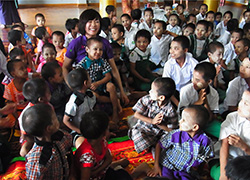Akie Abe, the wife of Japanese Prime Minister Shinzo Abe, gave a speech at the “Myanmar Festival 2014” in Tokyo on 18 October urging Japan’s business leaders to think of Burma as a potential long-term business partner rather than a source of cheap labour.
Ms. Abe has a reputation for being one of the most outspoken first ladies in modern Japanese history, and she isn’t shy about publicly stating her opposition to some of the primes minister’s key policy goals—including such controversial issues as nuclear power and her husband’s unpopular plan to increase the consumption tax. In fact, Akie has opposed her husband on so many issues that Japan’s media has dubbed her the “in-house” opposition party.
While some critics say Ms. Abe’s actions are a political ploy to soften the prime minister’s ultra-conservative reputation, Akie has demonstrated her long-term commitment to Burma by raising money to build schools in the country and even writing her master’s thesis about Burma.
Yet the Japanese government is also eager to convince Burma that it’s not only interested in making profits from Burma’s cheap labour force. Shortly after Burma “opened up” in 2011, Japan organized a conference in Tokyo which led to the cancellation of billions of dollars’ worth of Burma’s debt obligations, clearing the way for Burma to receive loans from international financial institutions. In addition, when Japanese Foreign Minister Fumio Kishida visited Naypyidaw in March, Burma’s state media announced that Japan had pledged to increase its financial contribution to various UN agencies in Burma by US$16 million.
At the time, Burma’s state-owned media reported that Japan’s $US 16 million contribution was part of an overall $75.2 million aid package Tokyo has been providing to UN programmes administered by the UNHCR, UNICEF and the World Food Programme (WFP) in Burma, and that Japan insisted that its latest contribution be earmarked for ethnic populations displaced by violence— including UNICEF deliveries of emergency food aid for children and pregnant women. In addition, the money was reportedly allocated to support UNHCR programmes for IDP camp management, services and shelters.
During the Japanese foreign minister’s visit in March, Burmese media outlets also reported that Japan had simultaneously announced it would provide the Burmese government with an additional US$23.4 million in loans to the Burmese government, in part to develop the Thilawa Special Economic Zone (SEZ) near Rangoon.
Several Japanese companies—including Suzuki, Toyota and Mitsubishi—have made commitments to invest in Thilawa, Japan’s flagship development project in the country. However, Japan has been criticized for its general lack of transparency regarding the Thilawa project, and the venture has been delayed by farmers who claim their land was confiscated in order to make way for the SEZ; their compensation was woefully insufficient; and that they were resettled in uninhabitable locations that are unsuitable for farming.
[related]
But Japanese and other foreign companies are still keen to invest in Thilawa, which is expected to be one of the few industrial zones in Burma with reliable water and electricity supplies along with ready access to the sea. Foreign investors are also encouraged by signs that government regulation of companies operating in the SEZ will be lenient.
For instance, earlier this month Burma announced rules which allow manufacturers based in Thilawa to use asbestos, imported industrial waste and toxic chemicals. The new rules also permit investors to engage in a wide range of business activities, most of which will benefit from Burma’s plentiful supply of cheap labour.
Regardless of whether Ms. Abe’s recent statement about Japanese policy towards Burma is part of a calculated political ploy to soften the image of Japan’s ultra-conservative prime minister, don’t expect Akie to slow down any time soon. For those who want to learn more about Ms. Abe, you can follow her on Facebook, where she’s been known to post unflattering pictures of her husband. And for those interested in Ms. Abe’s musings prior to her husband’s second stint as prime minister, check out her blog, entitled “Smile Talk with Akie Abe.”
The Myanmar Festival 2014 was held in Tokyo from 17-19 October and celebrated 60 years of diplomatic relations between Japan and Burma. Although last year the Japan Times billed the festival as purely a cultural event, this year Ms. Abe gave her controversial speech at a business forum held during the festival.
According to the festival’s website, the day before the cultural festival began several Burma-related business activities were held, and during the cultural festival itself Japanese companies apparently had a chance to display their products and services designed for the Burmese market.
One of the Japanese companies participating in the event was “Vision to Motion,” which said on its website that “We will participate in Myanmar Festival 2014 to introduce Myanmar culture, our line of services offering that support Myanmar market entry, and report what we are doing in Myanmar. Please feel free to visit our booth…”



